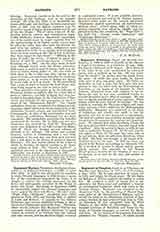

Raymond Martini, Dominican, theologian, Orientalist, b. at Subirats, Catalonia, c. 1220; d. after July, 1284. In 1250 he was selected by his superiors to study Oriental languages, in 1264 became a member of the commission appointed by Jaime I of Aragon to censure the writings possessed by the Jews, and subsequently preached to the Moors in Spain and Tunis. Returning to Barcelona (1269) he successfully taught the Oriental languages and wrote against the Jews and Moors. His chief work, “Pugio Fidei Christian” completed after 1278, printed in Paris, 1651, and Leipzig, 1687, is written in Latin and Hebrew. It appeals to the Hebrew Scriptures and ancient rabbinical writings to prove the truth of Christianity against the Jews. The work, which clearly indicates that Raymond Martini was extremely well-read in Hebrew literature, is much valued on account of its citations from the Talmud and other sources; and has also been highly esteemed as a polemical source. It is not probable, however, that it was known and used by St. Thomas Aquinas. Martini’s other works are the recently discovered “Explanatio simboli apostolorum ad institutionem fidelium edita”, written about 1256, of which important fragments were edited by Denifle, and two polemical works also antedating the “Pugio Fidei”, but both lost, “Summa contra Alcoranum” and “Capistrum Judseorum”
J. A. MCHUGH

